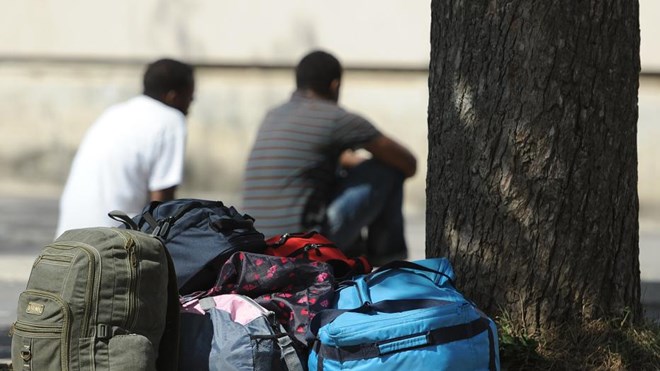
Wednesday September 3, 2025

FILE – Backpacks belonging to two African migrants rest at the base of a tree as they sit nearby
Mogadishu (HOL) — Austria has deported two Somali men to Mogadishu, the first such operation in 20 years, as European governments tighten asylum policies and step up efforts to return migrants with criminal convictions.
The Interior Ministry said the men had been convicted of drug-related crimes in Austria and were removed after completing their sentences. They arrived in Mogadishu this week, where officials said they were reunited with their families.
The move follows a sharp rise in Somali asylum applications in Austria. Between January and July 2025, 648 Somalis applied for protection, placing them third among nationalities seeking asylum. Authorities reported a 44% approval rate, with 463 granted asylum. Another 334 Somalis received subsidiary protection, shielding them from deportation due to safety concerns in Somalia, while 12 were granted humanitarian residence permits.
Austrian Interior Minister Gerhard Karner and German Interior Minister Alexander Dobrindt said Friday their countries plan to increase deportations in the coming months. Austria is preparing to deport a Syrian man, the first such removal in years, and has outlined similar plans for Afghan nationals starting early next year.
Officials said the moves are part of a “strict but fair” asylum system designed to address migration pressures. The European Court of Human Rights, however, recently blocked the deportation of a Syrian convicted of multiple crimes, ruling that his removal would pose unacceptable risks.
In Mogadishu, the return of the two men was met with distress from family members. Relatives told the BBC Somali Service they had been informed in advance by contacts in Austria that the deportation was imminent, but the actual return caught them off guard.
“I wasn’t home when he arrived yesterday, but I rushed over,” she said. “There wasn’t much conversation. He didn’t seem stable. His mind was elsewhere.”
She described her brother as withdrawn and visibly disheartened. “There was no warmth, no happiness,” one family member said. “He didn’t come back the same.”
The rise in deportations across Europe follow a political shift toward right-wing and far-right governments that have adopted increasingly hardline stances on immigration. In Austria, Interior Minister Gerhard Karner, aligned with the conservative Austrian People’s Party, has prioritized deporting migrants with criminal records, including Somalis.
Germany and Sweden have echoed similar policies, with ruling coalitions under pressure from surging far-right parties like Alternative für Deutschland (AfD) and the Sweden Democrats, both of which have campaigned on promises to reduce non-European immigration and dismantle humanitarian protections.
These political trends have translated into real policy: streamlined deportation procedures, reduced appeal windows for rejected asylum seekers, and bilateral agreements with countries like Somalia to facilitate returns.